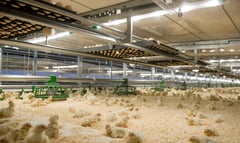"My research showed that 35% of broiler breeders develop 'footpad dermatitis'. However, this did not affect the number of floor eggs, apparently the hens were still motivated to lay their eggs in the nest."
Anne van den Oever is a researcher at Vencomatic Group, she obtained her PhD on the nesting behaviour of broiler breeders. One of her studies focused on foot pad lesions and its effect on nesting behaviour and possible number of floor eggs.
What is 'footpad dermatitis'?
"Footpad dermatitis' are inflammations of the soles of the feet of chickens. They are usually caused by standing on moist litter. This releases ammonia from the faeces, which irritates the skin and then causes inflammation."
"This phenomenon has been studied in broilers, but never in broiler breeders. We also wanted to see if there was a link with the number of floor eggs. Of course, it could be that chickens with sore legs do not feel like walking to the nest to lay an egg."
How did you carry out the study?
"We made compartments in a large barn, in each compartment there were 550 hens and 50 roosters, so a lot. We checked the leg health and the quality of the litter every 10 weeks during a whole production round of 20-60 weeks. In addition, we got the production data from the farmer and studied it for deviations."
"From each group, 50 hens were evaluated each time using a scoring system from 1 to 4. We noted that some groups had already developed foot pad lesions in rearing, but this did not seem to affect the development of the lesions at a later age. The foot pad lesions were common, with an average score of 2 at the end of the production round, with 35% showing severe inflammation. Heel and moving problems were not so bad, as these were relatively rare. There appeared to be no effect on the number of floor eggs either, apparently the urge to lay the egg in the nest is too strong."
What advice can you give farmers based on your research?
"Despite the fact that there is no effect of foot pad lesions on the number of floor eggs, it is of course a point of attention. Because it is mainly caused by the quality of litter, it is important to keep that quality high. In this respect, it is important to always ventilate sufficiently, also in winter. Often the ventilation is set very low in winter to save heat, but that does not benefit the litter quality."
"It can also be beneficial to provide more slats where the animals can rest, or extra perches. Then they have less contact with the litter. Litter is simply wood sawdust that is gradually contaminated by the birds' droppings, so you need to keep it as dry as possible for the hens to scratch and dustbath."
Was the research interesting to carry out?
"I found it was very interesting to do, I was allowed to decide on the design of my PhD research and I wanted to include this topic. My PhD research focused primarily on the nesting behaviour of broiler breeders. The main focus was on egg-laying: how do they choose an ideal place to lay the egg and what kind of behaviour do we see in the nest?"
"I find it very special that Vencomatic Group puts a lot of time and money into scientific research. I get a lot of space for in-depth research, which is special in the business world. Within Wageningen University there are hundreds of PhD students and only about ten who work for industry. In my department, there were only five people doing PhD research for their employer, the other fifteen worked for the university."
"I particularly like the cooperation between the university and industry, my findings can be applied directly in practice. Then you really see the results of your work."





